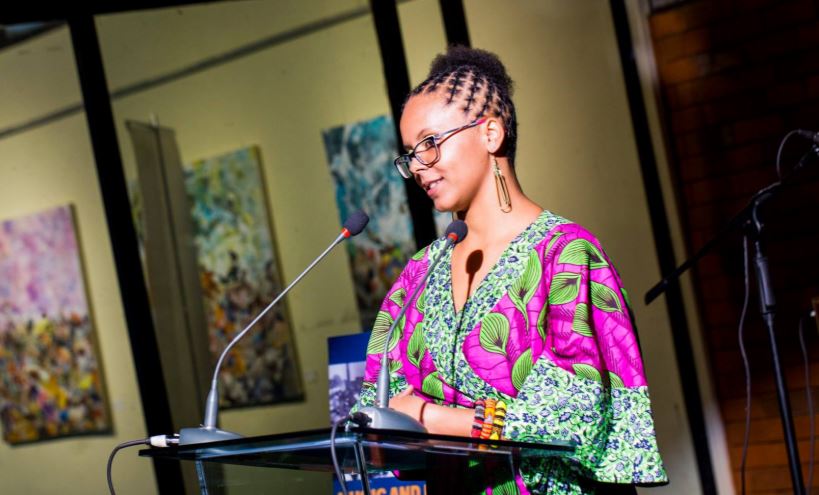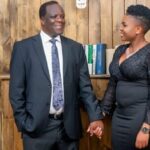 Kahithe Kiiru talks about her job as head of choreography at Bomas of Kenya.
Kahithe Kiiru talks about her job as head of choreography at Bomas of Kenya.
******************************************
The fact that my job is exciting is first and foremost due to the passion I have for it. I love my job and consider myself extremely blessed to be able to work in the performing arts field. I have chosen dance early on in my life and my enthusiasm for building a career in the field has never dropped. On the contrary, the more I grew both on a personal and artistic level, the more it became clear to me what I was put on this Earth to do.
Initially, I chose Kenyan traditional dance out of curiosity and, but as time passed by and I learned more and more, I realised this specialisation would have a permanent impact on my life. And then, things just fell into place.
Today I proudly act as the head choreographer of Bomas Harambee Dancers, Kenya’s national dance company, and continuously advocate for the development and promotion of Kenyan dance. Early mornings are not my most productive time of the day. I’m a night bird by nature. I had to train myself to wake up by 7 a.m. and kick my day off with a 15-30 minutes’ personal yoga and/or meditation session. The nature of my job is dynamic, and my daily routine is not always the same. As any dance company, we operate in seasons – during rehearsal season, I will report to work at 8:30 am and either just participate or lead the dance team in our morning workout sessions. After this, we commence rehearsals. But when we’re off season and focus on performances alone, I may come to work at a later time.
My history with Bomas of Kenya started while I was still a student in Paris. I was doing a master’s programme in dance anthropology and my research focus on traditional dances of Kenya brought me to Bomas first in 2011. Since that time I did several internships with the dance company and kept following their programmes even when I was abroad. Once I got a PhD scholarship, I started spending more and more time in Kenya, did extensive research on dance in Kakamega County and in the Coast, and got engaged as a research assistant in various projects. By the time my PhD scholarship was expiring, I had already made up my mind – I was going to settle in Kenya.
As most people, I experience different types of challenges in my work. There are personal challenges, related to my own personal growth; there are institutional challenges that we face as a team; and then there are conceptual challenges, or should I call them societal challenges, that all artists working in the field of performing arts in Kenya face.
On a personal level I think the thing I struggled with most (and at times still struggle with today) is authority – being in charge of a large troupe of artists is not an easy task. I am rather gentle and democratic by nature, so learning how to ensure discipline, when to push them harder, when to punish and how, etc., hasn’t been easy for me. I also struggle with taking distance from work, since my passion often results in excessive worry and that’s not healthy at all.
I was appointed to my current position to be a vehicle of change, to upgrade our levels of performance, to bring in new original ideas and insights from the international dance scene. Yet, as you can imagine, it is never easy to change entrenched systems and ways of operation. And neither is it easy to change people’s habits and perceptions. That is the essence of my day to day struggle in a state corporation Bomas of Kenya is.
As a team, the Bomas dancers face numerous challenges, many of which are related to the lack of understanding for dance as a profession. We live in a society where art in general hasn’t yet been fully recognised as a significant contributor to society nor as a valid professional choice. And the situation with traditional dance, in particular, is even worse. There is this horrid idea that people who chose to dance for a living do so because they had no other choices. The dance sector is still underdeveloped and we still have a lot of advocacy and practical efforts to do.
If I could tell my younger self something, it would be to trust in the process. And to have more patience. Things don’t happen overnight, at least not the important ones. And when we’re young at times we tend to get discouraged somewhere along the way. We also lack the self-confidence to follow our intuition and persist in our efforts. Today I believe that to be one of the most valuable lessons we should teach our kids. There’s a place for each one of us in our beautiful diversity. And if you follow your heart and trust the process, you will find yourself in the most amazing, unimaginable places, doing wondrous things…things that you were meant to do. So don’t let anyone tell you that your dreams are not valid. They just require time and stubborn effort.
I think the best advice I ever got was to be gentle on myself. I tend to be very self-critical and punish my own self for things I do not necessarily have control of. Someone I admire greatly once told me that self-care and self-forgiveness are indispensable for a happy and fulfilled life. And they were right.I’m currently completing a PhD programme in anthropology and writing my thesis on dance heritage in contemporary Kenya. It has been six years in the making now and I can’t really say what the initial motivation behind it was. From where I stand now, I guess it was a thirst for knowledge and understanding of the dynamic processes that have affected traditional dances in Kenya throughout history.
I also believe that scientific research validates artistic practice and affirms its significance in society. In the Kenyan context, little has been done to document and promote our dance heritage. And even less to develop and market it to the extent that other countries in this world have done. So, this is about way more than just a paper and a title. I take it as my duty to use the power of academia to preserve and restore our traditional dances and give them the visibility they deserve.
I love books. I’m not sure if I can pick a favourite one. I read widely, but have in the past few years been restricted by time and by the burden of my thesis deadline. I read so much in social sciences, that I was forced to reduce fiction to a minimum.
Some of the authors that marked my youth and in a way made me who I am today include classics by Frantz Fanon, Chinua Achebe, Wole Soyinka, Maya Angelou and Ngugi wa Thiong’o. I’m also a follower of contemporary African writers such as Chimamanda Adichie, Marie N’Diaye, Maryse Condé, Aminatta Forna, Alain Mabanckou, Yvonne Adhiambo Owuor and the late Binyavanga Wainaina.
I have a five-year-old daughter. She’s the light of my world. She pushes me daily to be a better version of myself. Motherhood has been the most rewarding journey and I give thanks every day for her. She also loves music, dance and arts in general. I always admire her strong character and how protective she is of her mummy. My Future is Secure.
Courtesy: Sunday Magazine






